REFLECTIONS ON CHANGES IN THE MARKETPLACE - PART II
Increased professionalism
by TurfPro guest editor, Ian 'Poggy' Pogson, Industry Stalwart
Guest editor, IAN 'POGGY' POGSON, industry stalwart and currently sales specialist at Campey Turf Care Systems, continues his look back at his long and varied career, considering how the groundscare sector has increased professionalism over the years.
Last time Ian 'Poggy' Pogson told us about his early days working for machinery dealerships and the early days of demo-ing at the IOG shows at Motspur Park. Here he takes up the story . . .
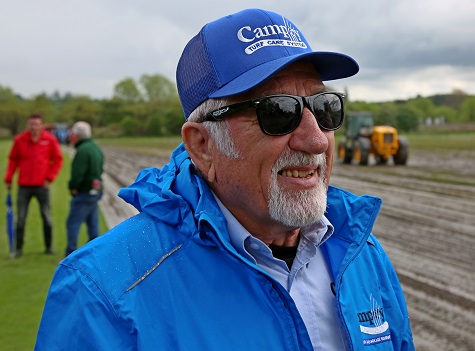
Industry stalwart, Ian 'Poggy' Pogson, currently sales specialist at Campey Turf Care Systems
Increased professionalism
Around the late 70’s, early 80s the industry had to become more ‘professional’ and to get ‘certificated’, as decreed by the government.
The words ‘professional’ and ‘government’ should never be seen in the same sentence in my view! But anyway, off we went on a course for a week to be educated, by a bloke who at a guess had never had any experience in front of the client base we had, (still, if you can’t do it teach, as the saying goes).
Brim full of the experience and knowledge we had been given, our next opportunity to show off our newfound expertise was at a dealer day on a golf course. We had equipment at various strategic points around the course and we were boasting, tongue in cheek of course, to the dealer’s staff and their sales force of how to be ‘professional’ when setting up machines and displays, presenting the company image etc. All the various sales aids to hand, presentations prepared, the day went off well. The only wayward things were the golf balls that wouldn’t go where they were supposed to (I thought you’re supposed to keep the ball on the short stuff!)
However, when the time came to load up all our gear, we had decided to collect the equipment at the farthest reaches of the golf course with the Land Rover and trailer. One piece of equipment was by a tee box on top of a hill. We, the ‘professionals’ decided to get on with it, got the ramps down and started to drive the tractor and attachment up the ramps. This, of course, has the initial effect of taking the weight off the rear of towing vehicle. “Hold on,” I can hear you say, “didn’t you put the stands down on the rear of the trailer?” We didn’t because being professional we didn’t want to mark the turf on this posh golf course.

Now, Land Rovers have transmission handbrakes effective on the rear wheels when they are on the ground. Lift up the wheels and what happens? Yep, they don’t work.
So there we were, the tractor half way up onto the trailer, the back wheels of the TD5 in the air and facing downhill - and it began to roll down the hill at an ever increasing speed! I shouted to the operator to either get on or get off. He thought I meant on or off the tractor, not get the tractor on or off. So he baled off the tractor and trailer. The unit was now gaining some speed/ I ran after it and fortunately, it being a nice day the driver’s window was down. I was able to get my head and shoulders to the waist in and heave at the steering wheel. The engine wasn’t running so it was only a partial steer, just sufficient to avoid a bunker and a dewpond at the bottom of the hill. It was an exciting ride, just over a 400 yards form the marker which fortunately was a concrete one and stopped the collection of Disco, trailer, tractor and attachment with me hanging my backside out the window!
Apart from a couple of grooves cut in the turf down the hill in the light rough by the tailgate, no damage was done. I thought we’d got away with this and breathed a sigh of relief. However, unbeknown to me, the dealer staff had taken the opportunity to have a round themselves and a foursome of the management could be seen at the top of the hill laughing their socks off, with cat calls and hoots of derision. “So that’s how professionals do it?!”
Ittook some living down I can tell you. Fortunately, camera phones hadn’t been invented then. Heaven forbid if they had - that would have made it into the annals.
On another occasion, a dealer had organised a similar event where after a very rainy night a newish golf club built on some strong ground, hosted the event. Present amongst us was a well-known brand of hillside tractor, with an experienced operator and a very green but enthusiastic sales rep. There would have been a couple of hundred people at the event and the idea was to have groups moving round. However, this young fellow hijacked most of the watches and said to his demonstrator to drive across the hillside.
“No,” was the answer from the demonstrator, “it’s too wet and slippery. It’s not safe.”
The rep replied “It’s a hillside tractor, of course it’s safe, it won’t turn over. If you won’t do it, I will.” The demonstrator answered with simple, “Please yourself”- and with that, in front of the assembled throng, the young greenhorn set off across the hillside in stately and confident fashion.
After about 40 yards the machine began to slip sideways on a patch where the water was coming out the built-up ground on the hill. A lack of experience immediately showed as the first thing he did was to put down the clutch and brake thus losing all traction. The hillside tractor promptly accelerated sideways a good 150 yards, where it disappeared into some scrub and woodland which stopped it before if fell 15ft onto a roadway.
The assembled gathering cheered and clapped before a thought of how the driver was. Of course we all eventually ran to help. And an extremely red-faced young man slunk off to the clubhouse, no doubt to get a clean set of underwear!
Further changes to groundscare
In my mind biggest change to the professional turfcare sector was the growth of colour TV and televised sport - football in particular. After the world cup in 1966 which was principally watched in black & white, we just assumed the playing surface was green. Usually only the FA cup was televised anyway, so the surface was incidental.
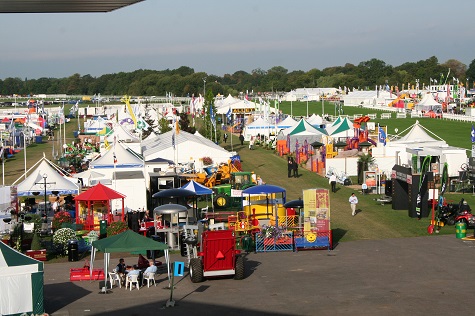
SALTEX at Windsor Racecourse in the 2000s
If memory serves it was when Murdoch and Sky got involved that the turnaround really occurred in earnest. After one particularly important match was played at Villa Park I think, the pitch was so wet and so heavily sanded that it looked like a beach, that the diktat came down to the FA from the TV people, ‘do something or we aint coming back!’ Clubs, the FA , and all and sundry had to buckle down. The groundsman then became a much more important figure.
The equipment available at the time was minimal. Other than mowers, we had a spiker for aeration, spreading sand was done by hand, and that was about it. The budget for the playing surfaces was minimal. One groundsman told me that the club owner wouldn’t give him the £1600 for a spiker, he had to use a fork. However, forward thinking turf professionals used their initiative and sweat of the brow. Machinery people, agronomists and plant breeders stepped up - and look where we are now. Our surfaces are the envy of the world.
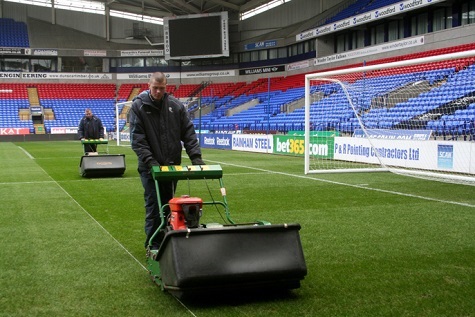
We export groundstaff and greenkeepers to all corners of the world. Whether the influence of the foreign managers and players had a part is subjective, but the emphasis of ball speed, running speed, a less physical side of the game as opposed the traditional British hoick it up field and chase it, helped toward improving the standard of playing surface.
I clearly remember walking out onto the hallowed turf of Wembley in the early days. It was like walking on a mattress, with the thatch build up tremendous. No wonder players were always getting cramp. But there was little equipment available and little incentive or inclination to rip it to bits, decompact, aerate and reseed - a common and essential practice these days.
Another giant leap forward is the hybrid surfaces. New maintenance practises have been developed along with machinery and cultivars to make these an almost must have for anyone in the world who have aspirations in major sport.
We now have a range of equipment to renovate all types of surfaces. We have new cultivars, grow lights with different colours to stimulate the plant, carbon tents, under pitch heating, blowers, and stadiums that take into consideration sunlight. If I’d have told you this years ago, you’d never have believed me.
Looking ahead

We’ve come a long way in a short time, and it’ll continue.
With the growth of social media another big plus is having the access to everyone in the world from the comfort of your pocket. It can be annoying and destructive, but used in a positive way, what a great sales aid. During the recent lockdowns and subsequent passage of time, it has been a revelation and kept many companies afloat, moved machinery in our case, and kept everyone in touch with developments and techniques one way or another.
One of the downsides is the growth of the ‘Google greenkeeper/groundsman. Now every supermarket shelf stacker and forecourt attendant can be the ‘best’! How many times over the past few years have we heard the story of clubs or greens committees overruling sound greenkeeping practices because someone has done a level 1 online?!
So, let’s take the positives, dispense with the negatives and go forward with confidence and in the knowledge that whatever the shortcomings of our country, in one thing we do lead the world - our industry!
Furthermore, when folks go on about the good old days let me tell you – these are the good old days.
Make the best of them.
 |
|
 |  |
BIGGA REVEAL NEXT PRESIDENT
Will take over role in January
In our first WEB ONLY story new appointee says it will be a privilege to serve greenkeepers, first in role as vice president, and then president of BIGGA.
LANDSCAPE SHOW POSTPONED
Was set for end of September
In our next WEB ONLY story organisers say the decision to postpone "has not been taken lightly".
STIHL ANNOUNCE REVENUE DOWNTURN
At international press conference last week
As well financial information, the manufacturer announced an addition to their in-house manufacturing portfolio whist presenting their latest products and the new Brand World facility to the world's press.
STIHL held an international press conference at their headquarters in Waiblingen, Germany on Wednesday last week, where they announced a downturn in revenue.

STIHL Brand World in Waiblingen, Germany
TurfPro attended the event that saw trade press from around the world gather to hear Michael Traub, chairman of the STIHL executive board say that the past eight months have "proven challenging" for the STIHL Group.
He confirmed that the company had generated revenue of 3.84 billion euros in the period from January to August 2023, which is a decline of 1.5% year on year. He also announced that the company's workforce had decreased by 0.5% to 20,311 employees worldwide as of August 31.
Michael Traub said, "After several years of strong growth, our markets find themselves in a period of temporary consolidation in 2023." He explained this downturn as being a consequence of consumers not spending as much on their homes and gardens as they were during the Covid years. He also cited the high energy costs hitting both themselves and their customers, as another factor affecting revenue levels.
He went to on say though that the company is looking to the future with confidence. "We have ambitious growth plans and continue to invest a great deal in our business," he said, "especially in batteries - the technology of the future - and in our global manufacturing and sales network."
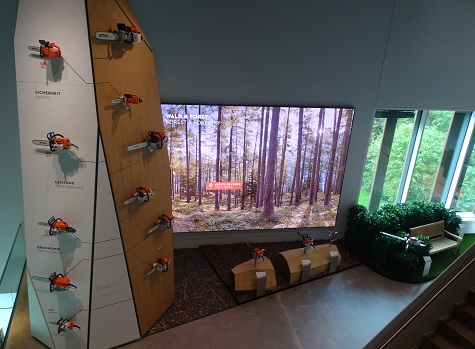
Inside Brand World
As part of this growth, the company have announced that they are to build its own EC (electronically commutated) motor plant for professional battery-operated products in Waiblingen. This will be the first time the company has manufactured their own EC motors in-house, which they said will ensure that the motors are a better match for their products as a whole. The facility will initially focus on producing these components solely for the pro tools and is set to start in 2025. The total investment was said to amount to roughly 17 million euros.

Demo of new professional battery-powered brushcutter
The meeting this week also afforded the company the opportunity to show off to the gathered press their new Brand World - a three-story exhibition space measuring just over 1,500 square meters. The modern, interactive facility highlights both the company's history and the development of its products - as well on focusing on the power and importance of forests around the globe. It's an impressive facility that will be both open to public and used to bring groups of STIHL's guests and dealers together.
 |  |
STUDENT GREENKEEPER WINNERS ANNOUNCED
Prestigious awards presented
Winners of the 34th Toro Student Greenkeeper of the Year Awards say they are united in a passion for the greenkeeping profession.
BIGGA, Toro and Reesink UK have revealed the winners of their student greenkeeping awards following a day of judging in the surroundings of Cheshire’s Carden Park.

2023 Toro Student Greenkeeper of the Year Awards winners Michael Russell (left) and Daniel Martin
With finalists representing eight education providers from across the UK, the awards also provide the students with the opportunity to develop their knowledge and expand their professional network.
The winner of the Toro Student Greenkeeper of the Year Award was revealed to be Michael Russell, assistant greenkeeper at Ormskirk Golf Club in West Lancashire. Michael’s nomination was endorsed by Phil Lomas, tutor at Oldham College.
Michael, 31, switched career four years ago from a role in the Civil Service and says he hasn’t looked back. A keen board game collector, he was a finalist in the 2021 hosting of the awards and has optimised his BIGGA membership, becoming an ICL Continue to Learn Scholar and graduating from the Future Turf Managers Initiative. He is married to Megan and has a one-year-old daughter, Millie. Michael was also the first finalist to ever score full marks in the multiple choice stage of the examination.
Michael said: “It was a little bit of a shock, but I know how much preparation I’d done coming into the finals. I think you can always underestimate yourself, seeing those around you and how much experience they have and their passion for the industry, but I was absolutely delighted to win and I know in terms of the rewards that are available as part of the event and just networking has been a brilliant opportunity.”
Runner-up in that category was Ryan Fiander, deputy course manager at Lees Hall Golf Club in Sheffield. Ryan’s nomination was endorsed by Andy Kenworthy, his tutor at Myerscough College.
The winner of the Toro Young Student Greenkeeper of the Year Award was revealed to be Daniel Martin, first assistant greenkeeper at Farleigh Golf Club in Surrey. A keen mountain biker and climber, Daniel is a thrill seeker who has found a professional passion in the greenkeeping industry. Daniel’s nomination was endorsed by Wayne Syres, tutor at Hadlow College.
Daniel said, “It’s a really good recognition of all the work that you have put into your career and studying to gain the extra knowledge to differentiate yourself from everyone else, so I felt satisfaction in the recognition of that work. For me, if I’ve achieved something well then it’s satisfaction of a job well done and on to the next one.”
Runner-up in the Young category was Jake Rose, apprentice greenkeeper at Moortown Golf Club in Leeds. Daniel’s nomination was endorsed by his course manager, Steven Robinson.
 |  |
AMENITY SECTOR STAKEHOLDERS SHOULD BECOME OCR COMPLIANT
Urge BASIS
Businesses and organisations should ensure they are compliant with government regulations say BASIS.
BASIS are urging amenity sector businesses and organisations to join their Amenity Assured scheme to ensure they are compliant with government regulations.

Peter Corbett
Local authorities and contractors working in the amenity sector who are subject to the Official Controls (Plant Protection Products) Regulations 2020 for the use of plant protection products (PPP), can now help to ensure their compliance with these new Regulations by joining the organisation's Amenity Assured scheme.
The OCR Regulations are enforced by the Health and Safety Executive (HSE) and were created so that Defra, the Scottish and Welsh Governments can gain a better insight across the UK into how PPPs are sold, used and stored.
Peter Corbett, Amenity Forum Executive Officer, explains who will need to become OCR compliant to use plant protection products in the future.
The HSE has now appointed a team of specialist pesticide enforcement officers (PEO’s), who are employed to ensure compliance with the 2020 Official Controls Regulations.
“Inspections have been taking place to check the compliance of duties under this new law since December 2021," Peter says. “Until now, the focus was on those businesses that store, distribute and sell plant protection products (PPP*), however the next phase also applies to anyone using PPP’s in local authorities and the amenity sector in the remainder of 2023-24.”
This means that those working in the following sectors: schools, parks, sports grounds (including golf courses), public or private property, infrastructure - (such as roads, railways and waterways), and utilities (such as transport and water companies) will need to be compliant.
Lindsay Smith, auditing and compliance manager at BASIS says why she believes becoming BASIS Amenity Assured can help employees and contractors in the amenity sector in the long run.
“When the official HSE inspections take place, the visiting Pesticide Enforcement Officer (PEO) will expect to discuss the use of PPP’s, either with the local authority itself and/or contractors that they are working with,” she says.
“Membership of the BASIS Amenity Assured Scheme gives amenity contractors offering professional pesticide services and advice to local authorities the best practice knowledge required for the inspections, as well as those using PPP’s in industrial, utility and environmental sectors.
“The scheme has a two-part annual assessment which consists of a self-audit and a BASIS audit. These audits look at all areas that will be covered by the PEO visits for the OCR. This includes pesticide use, documentation, equipment, training, environmental safety and records, to ensure compliance with legislation.
“By joining this voluntary scheme, endorsed by HSE, the Environment Agency and the Amenity Forum, it will ensure people and companies in the amenity sectors are legislation compliant.
“Membership of the BASIS Amenity Assured Scheme is also a way for local authorities and contractors to be recognised under the Amenity Standard, which is seen as the overarching standard for the sector. Becoming recognised under the Amenity Standard means companies are showing their customers and the public they serve that they are dedicated to best practice, high quality standards and performance,” she says.
*All professional plant protection product (PPP) users should have registered by 22 June 2022, however you can still register via the gov.uk website.
 |  |
CHARITY PARTNER CONFIRMED
For GMA Awards
GMA say they are keen to support a charity close to the hearts of many sporting figures.
The Motor Neurone Disease (MND) Association have been announced as the official charity partner of the GMA’s Industry Awards 2023.

The MND Association funds research, improves care and provides support for people with MND as well as their families and carers. With more than 5,000 people living with the disease across the UK, for which there is no cure, the work conducted by the MND Association is crucial in fundraising to support them.
With the Industry Awards ceremony being hosted at Headingley Stadium this year, the GMA say they are keen to support a charity close to the hearts of many sporting figures, especially those whose careers have been spent at the stadium.
In 2019, it was announced that Leeds Rhinos legend Rob Burrow MBE had been diagnosed with motor neurone disease and since then himself and teammate Kevin Sinfield OBE have been campaigning for support, with Kevin taking on a range of challenges in order to raise funds for the MND Association.
A spokesperson for Headingley Stadium said, “We are delighted that the GMA Industry Awards ceremony will be held at recently refurbished Headingley Stadium for the first time this year and are even more thrilled to learn that the GMA will be supporting the MND Association.
"Headingley Stadium has been home to players who have been personally affected by the disease and as a result, have seen firsthand the incredible work that the charity do”.
Kevin Sinfield OBE, England Rugby Union coach and patron of the MND Association said, “I’m very grateful that MND Association has been chosen as the charity partner for the GMA’s Industry Awards at Headingley Stadium. For a long time now, MND Association has been hugely important to me not only as Patron but also in supporting close friends and many others who have faced a diagnosis.
“It’s crucially important we all continue to bang the drum together to fight MND and take us closer to a cure for this cruel disease.”
 |
|
 |  |
GET READY FOR GROUNDSFEST
Stoneleigh Park, Warwickshire on 20 - 21 September
GroundsFest is set to be the largest, annual, free must-attend event for grounds staff, greenkeepers, machinery dealers, landscapers, gardeners, local authorities, estate managers and contractors.
The countdown is on and it’s time to get ready for the most anticipated event of the year. GroundsFest is set to be the largest, annual, free must-attend event for grounds staff, greenkeepers, machinery dealers, landscapers, gardeners, local authorities, estate managers and contractors.

Taking place at Stoneleigh Park, Warwickshire on 20 – 21 September, here is a snapshot of what attendees can look forward to.
Hundreds of brands and demonstrations
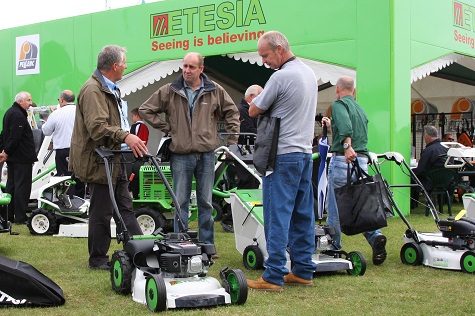
Hundreds of brands will be on display, and you will be able to see a wide range of products in action. The event will give you the opportunity to not only see a wide range of machinery in action but get up close and personal with it.
Practical training sessions
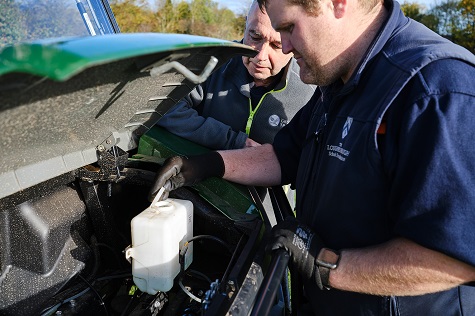
The programme will feature free hands-on, training sessions on a range of groundscare topics including line marking, pedestrian mowers, ride-on mowers, handheld machinery, and the calibration and use of knapsack sprayers and boom sprayers.
Free education and CPD points
With five seminar theatres, outdoor practical sessions, and an abundance of land-based education providers in attendance, GroundsFest is set to have the largest display of educational opportunities ever seen at a groundscare event.
BAGMA (British Agricultural and Garden Machinery Association) will also be offering advice about its specific industry training courses, and We Are Land-Based Engineering has a stand to provide information on a career in land-based engineering.
The Landscape Zone
The Landscape Zone will spotlight the latest outdoor environment technologies, solutions and innovations and will be a must-attend event for landscape architects, local authority landscaping professionals, garden designers, landscape contractors, interior designers, facilities managers and many more.
Live music festival

After an action-packed day at GroundsFest, unwind and continue networking with live music, and sumptuous street food. There will be great selection of DJ’s and live bands taking to the stage and there will also be beer tents and drink stalls. The festival will start at 5pm on the first day of GroundsFest.
Free on-site parking and free shuttle buses
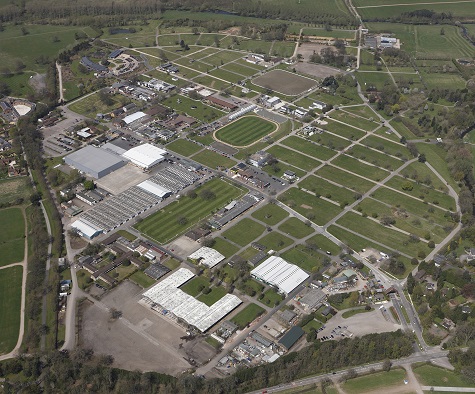
Stoneleigh Park has thousands of free on-site parking spaces. Free shuttle buses will also be available after the festival to take attendees back to their accommodation in Kenilworth, Leamington Spa and Coventry.
Register for free at groundsfest.com.
You can also follow GroundsFest on Twitter, Facebook and Instagram @GroundsFest for much more news, reviews and insightful views.

 |  |
BOOST YOUR PERFORMANCE WITH KRESS
If there’s a lawn, see how Kress can help you
Whether your business is managing commercial, institutional, residential, industrial, or public facilities, switching from contracted lawn mowing to a Kress robotic mower will make a positive change.
Whether your business is managing commercial, institutional, residential, industrial, or public facilities, switching from contracted lawn mowing to a Kress robotic mower will make a positive change.

Petrol-powered mowers can be heard half a kilometre away. Each time your lawn is serviced, it creates a disruptive and unpleasant environment, which has a negative impact on the well-being, productivity, and enjoyment of people using the space. Kress robotic mowers are so quiet that no-one will even notice they’re working.
Shifting to robotic lawn mowing promises significant environmental benefits through drastic carbon footprint reduction, coupled with a tranquil, noise-free atmosphere. This transition will not only enhance the turf’s health but also result in substantial operating cost savings.
Turfgrass experts indicate frequent mowing as the key factor for achieving a healthy, dense and attractive lawn, as it stimulates the grass to produce new shoots and leaves. Robotic lawn mowers are designed for mowing day in and day out and can operate at night time, without interfering with the availability of the lawn. The range of Kress robot mowers help provide your best turf ever.
Petrol-powered lawn mowers’ emissions are an issue you shouldn’t neglect. They harm the environment and the health of those using outdoor spaces: a petrol-powered lawn mower operating for one hour produces the same amount of pollution as a car driven for 160 kilometres. Kress robotic mowers are zero emissions and help mow down pollution.
Whilst robot mowers trim your grass, they also snips your costs. Switching from conventional lawn service to robotic mowing means you can reduce labour expenses. If you own the mowing equipment, achieve further savings from increasing fuel and maintenance costs.
Now the future of unmanned mowing is here with the new Kress RTKn robot mowers. Kress RTKn mowers extend unmanned mowing to larger areas. They efficiently operate in parallel lines and autonomously move from one area to another, as if they were driven by humans. Stripes, but with pinstripe accuracy. No need for boundary wires, nor on-site antennas.
Visit https://www.kress.com/en-gb/ for more.
 |
|
 |  |
ADVERTISE YOUR JOBS HERE
Amazing success rates!
Advertise your recruitment needs on TurfPro Weekly Briefing and reach our targeted audience of recipients every week.
Contact Nikki Harrison for details - 01491 837117
|
 |  |
EDITOR'S BLOG ARCHIVE
Catch up with Laurence Gale's recent blogs
Want to catch up with one of editor Laurence Gale's blogs? Here is the place to do so.
 |  |
TURFPRO FEATURE ARCHIVE
Find our previous features here
If you want to catch up with any of TurfPro's previous features, here is the place to do so.
TAKING A GLOBAL LOOK AT SUSTAINABILITY
Is the rest of the world also driving towards sustainable practice?
RENOVATIONS, PLAY AND THANKS
On my mind this week
SUSTAINABILITY – IMPLICATIONS FOR TRAINING & EDUCATION
Set to play a crucial role going forward
TULIP TREE
Liriodendron tulipifera
LYDIA BROOM
Genista lydia
THE LAWN AND ITS VALUE
Changing attitudes
GIANT HOGWEED
Invasive and potentially harmful
LIFE-CYCLE ANALYSIS & SUSTAINABILITY
Considering every stage of the journey
NITROGEN USE EFFICIENCY
The most important nutrient
BERBERIS THUNBERGII
A shrub that has stood the test of time
ENSURING FUTURE PROSPERITY
Advice imparted at road shows
INNOVATION & SUSTAINABILITY
A key focus
PHOTINA RED ROBIN
A sensational flowering shrub
VALUING THE GRASSROOTS
We must not overlook those who maintain these grounds
MANAGING WEEDS SUSTAINABLY
In amenity spaces
DETECTING NUTRIENT DEFICIENCY SYMPTOMS
In turf plants
SPRING RENOVATIONS UNDERWAY
A crucial period
SUSTAINABILITY IN SUPPLY
A focus on those who supply essential inputs to our sector
CHANGING CLIMATE
Is a borehole the key for clubs?
SUSTAINABILITY AT THE SHARP END
How to put into practice when budgets are tight?
ANOTHER NAIL IN THE COFFIN OF GRASSROOTS RUGBY
Clubs are struggling
SUSTAINABILITY IN PRACTICE
Seeking transparent and robust supply chains is essential
TIME FOR ACTION
To reverse recruitment crisis
CONTROLLING COSTS
Planning is crucial
THE SEARCH FOR SUSTAINABILITY
What exactly does the term mean?
CARING FOR THE GRASSROOTS
From volunteers to contractors
DEFRA IS LETTING DOWN THE COUNTRY
Complete failure to address the plastic grass debate
WE CAN ALL DO MORE
To aid biodiversity
MY LIFE IN GREENKEEPING
With Bruce Cruickshank
LEVELLING UP, GETTING SMARTER & GETTING AHEAD
Parks require so much more funding
SWITCHED ON FOR HARD WORK
Putting trimmers through their paces
MACHINERY HIGHLIGHTS
At this year's show
MY SALTEX
Daniel Lewis, Manchester City Football Club
AWASH WITH LEARNING OPPORTUNITIES
Two months till showtime
LOOKING BACK, LOOKING FORWARD
Priorities for the amenity sector
THE DECLINE OF ‘PARKITECTURE’
A symptom of the state of parks in 2022
DEVELOPERS SHIRKING GREEN SPACE RESPONSIBILITIES
Lack of financial commitment
TIME TO COME TOGETHER
For the good of the industry
THE DEATH OF GRASS ROOTS CRICKET
Gathering apace?
ROUTES INTO THE INDUSTRY MUST BE ENSURED
Q&A with David Fisher, Lantra’s head of industry partnerships
STRONG VIEWS ON CRICKET PITCH PERFORMANCE MARKING
A bone of contention
A PREMIUM PRODUCT
Delivered at Naas Golf Club
THE GREEN REVOLUTION
And Esker Hills
MAKING A CHANGE
Laytown and Bettystown Golf Links
A DAY AT THE RACES
Naas Race Course
WORKING TOGETHER AS ONE VOICE
How the industry needs to proceed
OVER 175 YEARS OF EDUCATION
Wesley College
ELECTRIC EXCITEMENT
Dennis's Ian Howard talks electrification
THE HOME OF CORK GAA
Páirc Uí Chaoimh
LONG POLE BATTERY HEDGE TRIMMERS TESTED
STIHL HLA 66 and HLA 86
OVER 800 YEARS OF HISTORY
Johnstown Castle and Gardens
A CLUB GONE WILD
Kilkenny Golf Club
A GOLF COURSE IN THE GARDEN OF IRELAND
Woodenbridge GC
80 YEARS YOUNG
Charleville Golf Club
AN UPLIFTING EXPERIENCE
Bunclody Golf & Fishing Club
GETTING BACK TOGETHER
Albeit gradually . .
GO WEST
Inishturk GAA pitch – one of the most westerly sportspitches in Europe
WORKING ON A TIGHT BUDGET
Nenagh Golf Club
ON A MISSION
Wrekin Golf Club aiming to enrich wildlife and fauna
WILD AND WONDERFUL
Design By Nature
LEARNING HOW TO SURVIVE
Abbey Par 3
TACKLING OBESITY
Vital that schools can provide sport
A LIFETIME OF LEARNING
Vital for turf professionals
CELEBRATING 125 YEARS
Tullamore Golf Club
UNIVERSITY CHALLENGES
At Trinity College Dublin
BLENDING THE OLD WITH THE NEW
Bray Golf Club
A WELL POLISHED COURSE!
Ierne Social And Sports Club
IDENTIFYING THE TRUE VALUES
Of grounds maintenance
THE INDUSTRY WILL CHANGE & ADAPT
But it will survive
WIRRAL GOLF COURSES SAVED
Renewed hope and optimism for the future
GREEN SPACE CONTRIBUTION TO WELLBEING IS UNDERVALUED
Parks invisible on national agenda
A SHINING LIGHT IN IRELAND'S SUNNY SOUTHEAST
Wexford Golf Club
GREEN SPACES DO NOT LOOK AFTER THEMSELVES!
Keith Kent says we must invest in people
WE SHOULD TELL THE WORLD ABOUT THE UK INDUSTRY
Right time for all sides to come together
SOIL LIFE IS PRECIOUS
Good-quality soil can help save the planet
MORE THAN JUST CUTTING GRASS
Encouraging the next generation
A BUZZ FROM DOING THE JOB
Wide experience of the turf grass industry
PAYING THEIR WAY
Low wages is the bane of the industry
AMENITY MANAGEMENT IMPACTS US ALL
Professor John Moverley
CARING FOR PARKS OF ALL TYPES
Mary Worrall
TOP FIVE FRUSTRATIONS FOR CRICKET GROUNDSMEN
What causes you the most frustration in your role?
PROFESSIONALS AT THE CUTTING EDGE
Vic Demain and Phil Sharples
BOWLS CLUBS IN PERIL
A sad decline
A VERY SPECIAL INDUSTRY
Loz looks back
SNEAK PEAK AT A ROBOTIC "GAME CHANGER"
Commercial model capable of covering 50,000 m2 teased
HALESOWEN PICK A BIG ROBOT UP FRONT
Invest in mowers
COMPRESSED AERATION
The new way
PARKS MATTER MORE THAN EVER
Recent sector developments
ON TEST
STIHL blowers
THREE CORE VALUES TO SHAPE OUR INDUSTRY
Real concerns for the future
ENGLAND'S GREEN SPACE GAP
A split along racial lines
ON TEST
EGO STX3800 strimmer with RTX2300 Rotocut head
A SECTOR FACING IMPORTANT TIMES
Review of the National Action Plan
PARKS MATTER
The role of public parks in the recovery: a discussion paper
A UNIQUE SPORTING VENUE
Wormsley private estate
A BTME OUTDOORS?
A good bet for the industry
PARKS NEED APPROPRIATE POLITICAL REPRESENTATION
Q&A with Philippa Reece, Parks and Foreshore Manager at Adur and Worthing Council
CRICKET LOAM
What does it mean?
A HERCULEAN EFFORT TO GET PARKS BACK TO NORMAL
Q&A with Chris Worman, Rugby Borough Council’s parks and ground manager
ON TEST
STIHL battery products
TURFGRASS STRESS MANAGEMENT
Reactive Oxygen Species (ROS) and antioxidants during biotic and abiotic stress in turfgrass plants
AUTUMN DISEASE MANAGEMENT
The coming months are going to prove very difficult
THE ABUSE OF PARKS . .
Is the abuse of society
WHY PARKS MATTER?
A statement from the Parks Management Forum to the Prime Minister
THE 21st CENTURY PARKS MANAGER
Innovative, creative and entrepreneurial
EAT, SLEEP, CUT, REPEAT!
Cricket under covid
TIME FOR A SINGLE SHOW?
Debate brought back into focus
A CHALLENGING TWO MONTHS
Running golf design projects from home
PRESSURE SITUATION
Cementing the reputation
A CLUB TO BE PROUD OF
10 years at the helm of Olton GC
GAME CHANGERS IN TURFCARE
The day the Lord's outfield reconstruction proved its worth
THE ESSENCE OF ESSENTIAL
Finding a sensible way forward on defining "essential maintenance"
THAT WAS THE YEAR THAT WAS
2001
HOW TO LOOK AFTER A GOLF COURSE WITH NO GOLFERS
Fundamental to the survival of almost all courses, if not of the game itself
RAIN STOPPED PLAY WOULD BE WELCOME
. . along with ‘lunch is being taken early’
PHYSICAL CONTROL OF TURFGRASS PESTS
An urgent problem
A DIVERSE & ENTERTAINING WEEK
Successful BTME 2020
INTEGRATED PEST CONTROL
Opportunity to embrace new methods
ENVILLE ON THE UP
Major investments taking place
GREEN FLAG AWARDS 2019
A great success
U.S PROFESSIONAL EQUIPMENT SHOW EXCELS
Buoyant GIE+EXPO
LEGACY OF THE SOLHEIM CUP
At Gleneagles
A DAY OUT WITH THE LADIES
Behind the scenes at the Solheim Cup
COVENTRY UNIVERSITY'S EDIBLE GARDEN SUCCESS
2006 - present
HAIL THE GRASS MASTERS!
Boorish media comments about pitch quality are wide of the mark
CONTRACTOR SEES MULTI-DISCIPLINE SUCCESS
360 Ground Care serving professional facilities
BUSY TIMES
Judging the Green Flag Awards
TAKING AN INTEGRATED APPROACH
What does it all mean in managing turf surfaces?
UNDER PRESSURE
Dry weather conditions continue to keep turf managers focused on moisture management
EDDIE SEAWARD
Death of Wimbledon’s influential grounds manager
MAJOR NEW IRRIGATION PROJECT
At Top 100 classic Berkhamsted Golf Club
NEW HORIZONS FOR THE HATTERS
Investment paying off at Kenilworth Road
ELIZABETHAN RESTORATION
At Castle Bromwich Hall Gardens
WHAT IS BIOPHILIA?
The vital impact of parks and green spaces on health and well-being
WORM CONTROL
Without carbendazim
THE TRUE COST OF PETROL
Battery-powered outdoor power tools are now turning the heads of professionals
SANDS OF TIME
Sand-based pitches are now the norm in professional sports
WHY DO WE DO THE RIGHT THING?
We must maintain industry standards
CHASING GRASS PERFECTION?
11 things you need to know . . .
MAINTAINING STANDARDS
Q&A with BASIS ceo, Stephen Jacobs
STRI RESEARCH DAY 2018
Hosted at research trial grounds in Bingley
THE MECHANIC
Leicester City FC invest in new role
LORD'S 'GRASS-GUVNOR' TO RETIRE
Mick Hunt bows out after 49 years
HOLLOW CORING & DEEP SCARIFICATION
Is it really necessary?
 |
|
 |  |
 |  |
 |  |
 |  |
CONCERN FOR PARKS FOLLOWING COUNCIL BANKRUPTCIES
What does the future hold?
by Laurence Gale, TurfPro editor
With budgets for parks already slashed, what will happen to resources now several local authorities have declared bankruptcy?
As an ex local authority parks officer for Telford & Wrekin Council, and having started my working career as a parks apprentice with Birmingham City Council, I and indeed many other parks managers have been left to ponder what the future of parks and public open spaces will be, in the wake of the recent shocking announcement that Birmingham City Council has effectively declared itself bankrupt.
The council’s head of finance took the dramatic decision to issue a section 114 notice, indicating that it did not have the resources to balance its books. As stated in The Guardian, Woking, Croydon and Thurrock are among the other councils to also have made similar announcements recently after botched investment projects and deep funding cuts.

Cannon Hill Park, Birmingham
I, and many hundreds of experienced parks managers, have been worried for a number of years now on what the future holds for public parks and open spaces - especially as they have never been recognised as a statutory service.
It will certainly be interesting whether we will now see a number of other local authorities issuing 114 notices in the coming months and what impact this will have on the maintenance and management of parks and green open spaces.
For well over thirty years, we have seen a general eroding of public funds - especially those budgets assigned for the maintenance of parks. The extent of these cuts and their impact on maintenance, programming, and accessibility can vary.
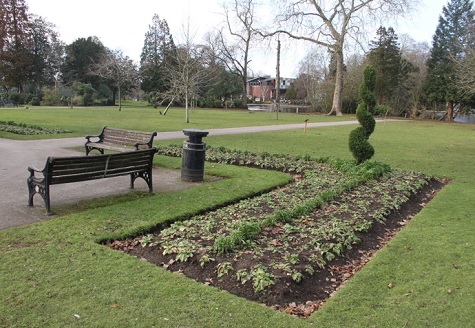
Cannon Hill Park, Birmingham
But in the main, we have seen a dramatic cut in parks’ budgets, with many maintenance regimes slashed to the bare bones. Gone are the days when we boxed mowed the grass on a weekly basis.
Most parks departments now have radically changed and reduced their mowing regimes and are using the terminology of ‘rewilding’ as a positive cost-cutting exercise.
It was essentially the CCT (Compulsory Competitive Tendering) Act of 1988 that was a significant piece of legislation in the United Kingdom that had a significant impact on local authorities, including their provision and maintenance of parks.
The CCT Act introduced competition as a central principle in the provision of public services. Local authorities were required to open up these services to competitive tendering, which meant that private companies and other organisations could bid for contracts to provide park maintenance services.
One of the primary objectives of the CCT Act was to achieve cost savings and greater efficiency in the delivery of public services. Local authorities were encouraged to seek competitive bids, and the expectation was that this competition would lead to reduced costs and improved value for money in park maintenance.
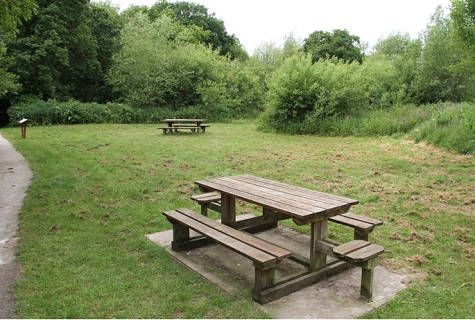
Wirral Country Park
The CCT Act was controversial, and it faced criticism from various quarters. Critics argued that it prioritised cost savings over the quality of services and that it led to a loss of control by local authorities over important public amenities like parks.
The impact of the CCT Act on parks provision and maintenance varied across different regions and local authorities. Some areas saw significant improvements in the quality of park services, while others faced challenges, including disputes with contractors and concerns about service quality.
Over time, there were reforms and amendments to the CCT legislation, and the policy approach to outsourcing and competition in public services evolved. The CCT Act was eventually replaced by the Local Government Act 1999, which introduced Best Value as a framework for assessing and improving the delivery of public services.
However, the overall impact of the CCT Act of 1988 and the way the councils constantly restructured themselves had a significant impact on local authorities' provision and maintenance of parks in the UK.
Staffing levels were dramatically reduced in that time, along with the actual park’s budget now at an all-time low. Effectively I believe, we have been dumbing down parks services for far too many years.
For me, it is really down to the public to start to complain and demand better services - while at the same time realising they may have to pay more in council taxes to retain these essential services.
I am sure there are plenty of people who would be prepared to pay additional council taxes if they could be guaranteed this additional money would be spent wisely and efficiently.
However, in the light of the recent news, a lot of the blame falls on the councils themselves, who have failed in the management of their council budgets and more importantly wasted many hundreds of thousands on failed projects.
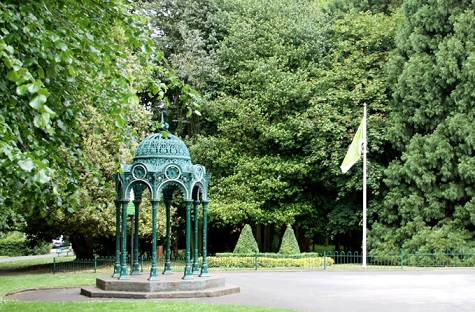
Victoria Park, Tipton
When I was a parks officer, I knew to the last penny how much I had spent in any one year and had a good understanding on managing parks’ budgets. However, these days when I ask a park professional as part of my Green Flag judging visits, what the budgets are for a particular park, very often they are not able to tell me. Either because they don’t know or the parks budget is part of a bigger scheme and they are not privy to that information.
I personally know from my own experiences how budgets can get lost or eroded away by other departments needs and politics.
So, what can be done? Well we have seen in recent years a number of options that have worked well. Some city councils explore public-private partnerships to help maintain and improve parks. These partnerships can bring in private investment for maintenance, upgrades, and new amenities in exchange for concessions or long-term lease agreements.
In the face of financial challenges, communities often play a crucial role in preserving and enhancing public spaces. Volunteer groups, nonprofits, and residents may organise clean-up efforts, fundraisers, or advocacy campaigns to support their local parks.

The Quarry, Shrewsbury
To make the most of limited resources, cities may prioritise sustainable practices in park management, such as using drought-resistant landscaping, energy-efficient lighting, and water-saving technologies and more recently the introduction of battery powered machinery.
It's important for residents and community stakeholders to stay engaged with their local government and advocate for the preservation and enhancement of parks and public open spaces.
Let’s hope we can find a solution to the future management of our valuable parks and public open spaces. As a member of the Parks Management Association who represent parks managers, it is vitally important to me that we can find a solution and more importantly lobby government ministers to find a way to secure future essential budgets to maintain the 398 principal (unitary, upper and second tier) councils in the UK. These councils, along with several trusts, charities and other organisations, manage between them 27,000 public parks across the country.
 |
|
|
|